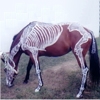|
Advice article filter
|
InjuriesInjuries occur in every sport. It happens to people as well as horses. A horse is considered lame when pain causes him to alter the usual weight distribution on one or more limbs. Lameness can be the result of many different causes (i.e. a straining or sprain of the tendons, ligaments or joints). But also over-use, hoof sores, quicking (an injury by driving a nail into the quick, i.e. any of the sensitive structures within the hoof capsule) or a deviating formation of the legs may cause harm. We distinguish 2 kinds op lameness;Weight-baring lameness (the unwillingness or inability to bear weight on the affected leg) and Motion lameness (an alteration of the horse’s gait) How do I recognize an injury? In most cases you’ll notice immediately when your horse is injured, because his movement will differ. In general the horse “falls” on the healthy leg. A lame horse will use his head and neck for balance and to relieve weight on the unsound limb. If the horse is lame behind, he will “hitch up” the unsound quarter in an attempt to keep weight off that side. When the horse refuses to move at all, possible causes can be fractures (bone fractures, tying-up or Monday morning disease, founder or quicking. What can I do? When your horse is recovering from an injury he doesn’t need extra energy and protein, and you can cut his concentrates in half or even cut them out all together. Your horse is likely to get nervous or too heavy from concentrates. But he still needs his daily ration of hay with additional vitamins, minerals and trace elements, which can be fed in the form of a complete vitamin and mineral supplement. These nutritional supplements are an adequate addition to a diet that consists of large amounts of hay and little to none concentrates. 
|

